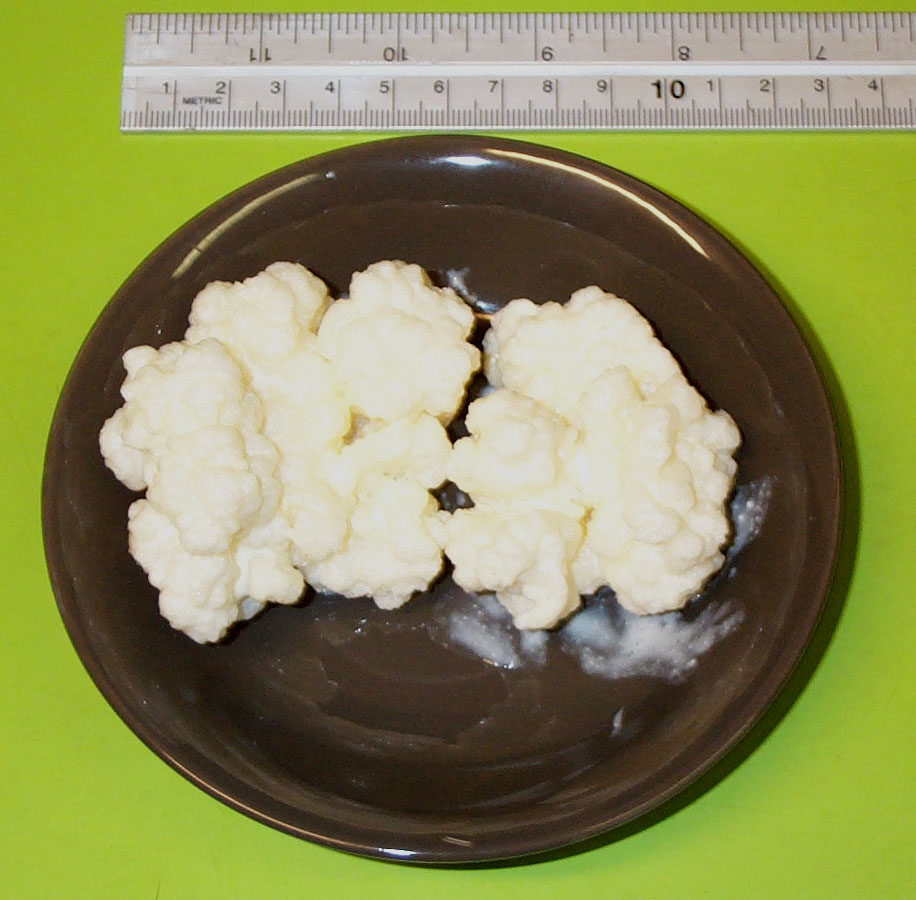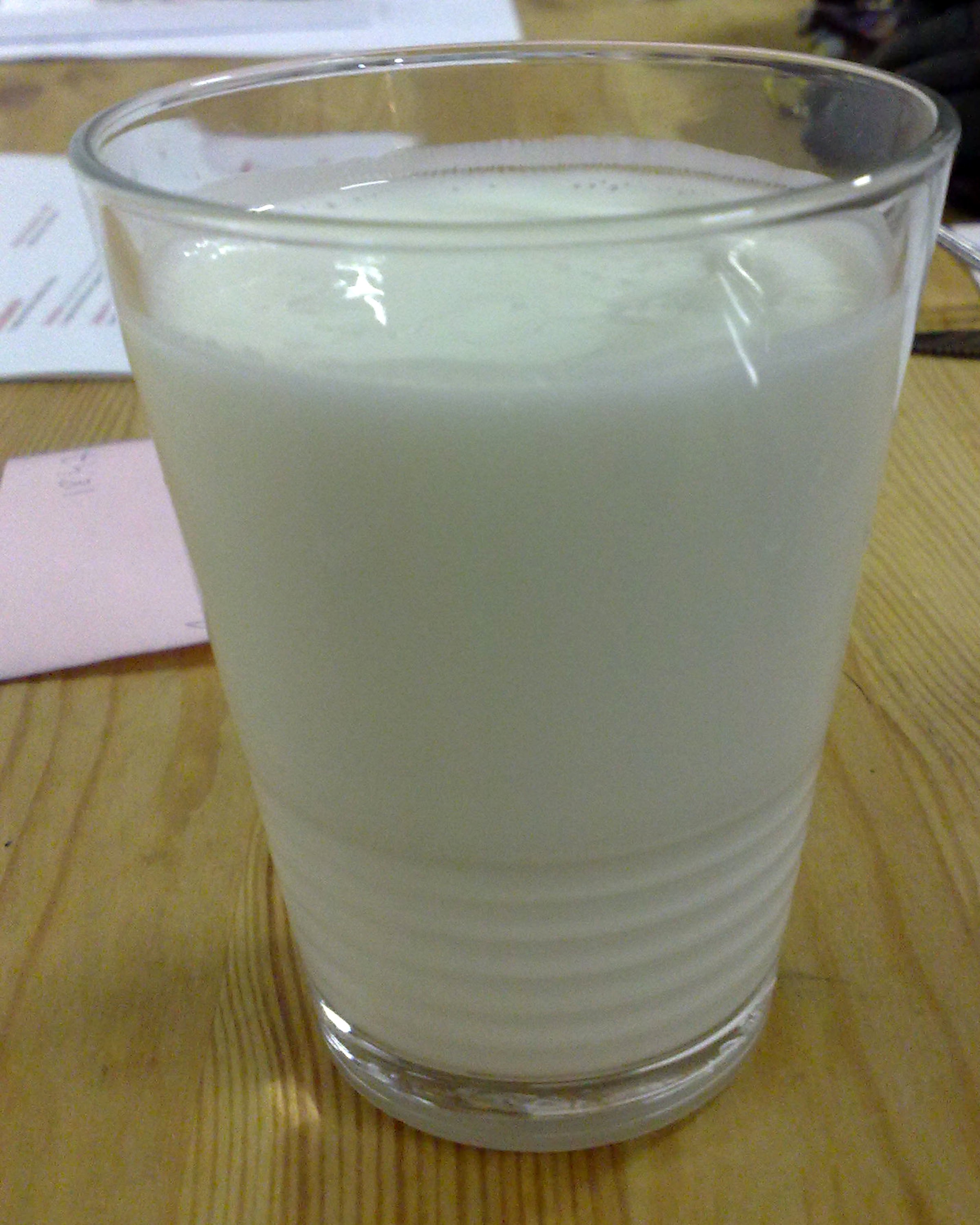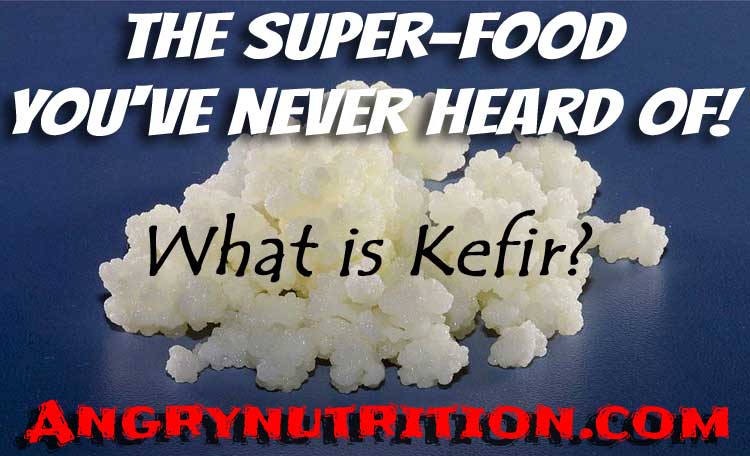Today I want to tell you about something very important to me: Kefir. It’s a bit complicated, but stay with me. Here’s a quick list of health benefits I’ll discuss:
- Help you lose weight
- Strengthens your immune system
- Helps balances your gut flora
- Helpful for lactose intolerant people
- Drastically improves digestion
- Can possibly eliminate IBS and other chronic inflammatory diseases
- Most importantly, it tastes AMAZING!
Hopefully by now you know there’s bacteria in your body.
Technically there’s more of them in your body right this moment than there are people living on the earth. In fact, your body is 90% non-human cells, it’s pretty important to understand them. They’re crucial to good health.
You depend on them and they depend on you. You can’t escape them, nor would you want to. If you were completely sterile inside, you’d die. They’re the ones who process your food, they keep you safe from intruder organisms, and they essential to good digestion and a good immune system.
The problem is that most people don’t understand them at all. They don’t understand why it’s a bad idea to constantly pour sanitizer on their hands. They don’t understand why it’s a bad idea to run to the doctor to get antibiotics at the first sign of a sniffle. They don’t understand how bad bacteria can be slowly killing them from the inside. They don’t understand how the body really works!!
I’ve talked about much I love fermented foods in the past. I’d like to introduce my favorite one of all: Kefir!
What is “KEFIR”?
Fermented milk. Simple as that. Think of a slightly more sour, more liquified version of yogurt. It’s delicious.
It’s pronounced as “keh f é-er” [as in keh in kettle, and fear]. Kefir is said to be derived from the Turkish word keif, which loosely translates to “good feeling” or “feel good.”
There’s a huge website out there that I hesitate to show to people because it is very complicated and hard to read. It’s made by a crazy, yet very smart Australian man named Dom. He has created a huge library of information about this miracle food, but… well… it’s hard on the eyes… and he makes terrible jokes.
That aside, I call it “Everything You Always Wanted to Know About kefir (But Were Afraid to Ask)” It can be found here: http://users.sa.chariot.net.au/~dna/kefirpage.html (You have been warned)
According to Dom, Kefir has its origins in the north Caucasus Mountains around 3,000 BC. Those people were renowned for longevity, living long, healthy lives with little to no known disease. An active life span of over one hundred years was common for folks living in the region where kefir was cultured and liberally consumed as part of a staple diet. These were some of the healthiest people in history.
They basically found it by accident and it turned out to be a super-food to rule all super-foods. How did they make it? Bear with me here: They left little cauliflower looking things in raw milk. They’d store them in these goatskin bags and place them in doorways. The visitors would smack the bag as they entered and exited as a tradition.
It sounds so weird, but there’s a good reason for all of this, I’ll explain shortly.
Fermentation?
Most people, including myself a few years back, have never heard of such at thing. Most people don’t really understand fermentation in the first place. Just as a reminder, Wikipedia defines as: “Fermentation is a metabolic process that converts sugar to acids, gases and/or alcohol.”
In this case, these little cauliflower looking “Grains” are a matrix of “protein, amino acids, lipids [fats] and soluble-polysaccharides. ” It’s a little bundle of symbiotic yeasts and bacteria, basically. As you make kefir with them, they’ll actually grow and split apart. Over the course of a month, they can double in numbers! As long as you keep feeding them, they’ll keep reproducing forever.
Long story short, they eat up the sugars from the milk (lactose) and produce “lactic acid“, which is what makes kefir and yogurt have the sour taste. It’s essentially vinegar. The good news is this is extremely good for you!

kefir grains
According to the direct Kefir Wiki page, here’s the constituents of kefir:
- Micro-organisms: lactic acid bacteria, yeasts
- Fermentation Products: carbon dioxide, ethanol (alcohol in very small amounts)
- Nutrients: protein from milk, polysaccharide
- Vitamins or pro-vitamins: vitamin A, vitamin B1, vitamin B2, vitamin B6, vitamin D, vitamin K2, folic acid, nicotinic acid
- Minerals: calcium, iron, iodine
- Water
- Folic Acid (B9) if left to ferment longer
It’s a pretty impressive list. Dom has a list of all the other specific ingredients here.
Ultra probiotic benefits?
I’ve always had a fascination with biology and microbes. Turns out kefir is absolutely crammed full of very beneficial probiotic strains of these little guys. Dom has a list here, I won’t list it because it’s very long. I forgot where I read this, but one small cup of kefir is roughly the equivalent of 1 million bottles of probiotic pills. The sheer number of beneficial bacteria in this cup is staggering.
It’s got tons of benefits for health. For me personally, I love the taste more than anything. It has a special place in my heart because of how good it tastes. It has a very unique aspect of taking a few second to really “hit” you with the flavor, but it’s so insanely good.

Delicious probiotic drink
It may not be for everyone, but I’m the kind of guy who likes dry wine and dark coffee. It’s too bitter to some, super flavorful to others. A little extra milk or honey mixed in can help make it more palatable.
I’ve found that many grocery stores and health food stores now stock it in the dairy areas. While you can give it a try, remember it’s nothing like the real thing. Most of the beneficial bacteria are killed off from pasteurization and they dump sugar into it for taste. In other words, completely missing the damn point of this super food!
Kefir can help you lose weight!
I’m convinced that there’s a strong link to weight loss and low carb diets due to the simple fact that it starves off certain strains of harmful bacteria. Those bacteria thrive on what else? Refined carbohydrates. Remove those from your diet and you’ll see a difference.
Without going into too much detail, those bad bacteria are more “efficient” at getting calories out of food, where the good bacteria are not. When you kill off those bad bacteria with a low carb diet, you’re automatically getting fewer calories from you food, and thus you LOSE WEIGHT!
In addition to this, adding kefir will do two important things: help control/kill off the harmful bacteria, and replace the empty spaces with beneficial bacteria. The beneficial bacteria will be able to better extract the good nutrients and minerals from your food. It’s win-win all around!
For added benefit: combine these with intermittent fasting and you’ll have a very powerful way to keep your weight down. I do it almost every day and I’m still looking great!
How do I make kefir?
Just put in some kefir grains in high quality whole milk and leave it out overnight. Yes, you read that right, outside of the refrigerator. I know this will scare some people, but trust me. I do it almost every day. I have some sitting at home on the counter right this moment. After all, the people of caucus didn’t have refrigerators in their huts and they made it safely! The cold would actually cause the micro-organisms to go into a “hibernation” of sorts.
Got that? Cold = low bacterial activity = little/no fermentation.
It’s safe because the kefir has self-protective mechanisms for preserving the liquid.
Namely, the acidic byproduct of the fermentation prevents bad bacteria from surviving by changing the pH. Those bad bacteria cause the purification process from starting in the first place!
Don’t believe me? I once accidentally left a bottle of unrefrigerated kefir out for about a month in a sealed bottle. When I found it, out of curiosity, I tried it. It was extremely strong-smelling and very VERY sour, but it was still drinkable. Dom even experimented with leaving some out for 10 months, and it was still drinkable! This is very powerful stuff, people.
Over the course of one night, those bacteria and yeast will gobble up the sugars in the milk, increase the viscosity and sourness of the liquid, and produce carbon dioxide gas. I make mine in mason jars and make sure to release the built up gaseous pressure every so often (2-3 times a day) The gas can become very powerful if you let it sit for too long.
I also give them a good shake to help redistribute the grains and make sure they have access to the sugars in the milk. This is why those people of caucus would smack the bag, to move around the grains! Traditions can have some interesting backstories, eh?
This is something that I will cover in another post because there’s a lot to talk about. Plus, I need to take some picture of my personal setup. Until then, here’s a few places to check out:
- http://www.culturesforhealth.com/milk-kefir
- http://www.cheeseslave.com/how-to-make-kefir/ (Don’t use metal if you can use plastic instead. The acid can actually eat away at it!)
How do I get kefir?
That’s hard to say, I’m afraid. There’s many options, but not all grains are created equal…
The person who I acquired my grains from was Dom himself, and I’ve heard he’s been very busy and is unable to send them out. Besides that, shipping all the way from Australia is expensive. (~55$!!)
You can Google around for kefir grains, but honestly you never know what quality you’re going to get. I love Dom’s grains because he has many diverse bacterial cultures built into those original grains. This makes them ultra-probiotic benefit and very resilient. They’ve survived many things that store-bought/low quality grains would not have survived.
The better quality grains mean better health for you. Get the best you can.
Having said that: I’m willing to send out my extra grains for a price, email me if you’re interested. I don’t make a huge amount so I can only send out so many at a time, but you might get lucky. I’ve had mine for about a year and a half and I use high quality milk. You can’t get these from the store.
You MIGHT get them locally off Craigslist. (which is where I sell my extras normally.) There’s a few sites that sell grains, but again, you don’t know if they’re being honest about quality.
As proof, I’ve asked the people who buy my grains to email me back about the health benefits they’ve noticed from drinking kefir. So far, I’ve had people say it’s completely taken away their IBS and greatly helped with other digestive issues! Kefir is great because it goes deep into your system and spreads the good bacteria where it can help you most.
I can go on for hours about fermentation, gut bacteria and the immune system, but I know people have short attention spans. I’ll make a post about how to make them, the tremendous health benefits of fermented foods, and the importance of the immune system for babies and children. This is just scratching the surface!
More FAQs:
http://users.sa.chariot.net.au/~dna/Makekefir.html
http://www.culturesforhealth.com/kefir
http://www.culturesforhealth.com/milk-kefir-frequently-asked-questions-faq
Kefir takes some effort to make yourself, but it’s a delicious way to keep your immune system BULLET-PROOF. I’ve personally only gotten sick once in the last year or so and I’m certain the probiotics of the kefir keep my system running strong. Stay tuned for more info. Thanks for reading.
Be sure to check out my Facebook page, Google+ page, Pinterest page, and sign up for my newsletter.
Your friend,
-Yossif
Img Credits: http://users.sa.chariot.net.au/~dna/images/goatskin-bag.jpg http://upload.wikimedia.org/wikipedia/commons/0/05/Kefir-grains-90grams.jpg http://upload.wikimedia.org/wikipedia/commons/c/cf/Kefir_glass_london_feb_10.jpg






Hi Yossif,
I have been using and making probiotics for years but I have not made or tried kefir, so this post is both illuminating and inspiring. You have provided “everything you need to know to make, use and appreciate the benefits of kefir”. Thank you for sharing this healthy natural superfood at the Special Holiday Edition of the “Healthy, Happy, Green & Natural Party” Blog Hop! I really appreciate it.
You’re very welcome! I’ve got more articles planned for explaining more about kefir, but only so much time to work on them… bear with me, lol. Thanks!!
After the Kefir is made can it be placed in the fridge for a bit to get cooled, as I just don’t like room temp drinks. Would this be like buttermilk in flavor?
Just wondering does buttermilk have probiatics too?
Thanks
Hi Eva, thanks for the question. Yes, you can place the kefir in the refrigerator once you’ve let it sit at least half a day or so. It will lock in the exact level of sweetness/sourness to your liking, whereas leaving it out in room temp will let the probiotics continue to multiply. Personally, I would let it sit for about a day and a half and then drain the kefir, replace the grains with fresh milk, and put the new kefir in the fridge. If you let it go too long, it might become too sour.
The taste is hard to describe, especially because no 2 grains are the same. I guess buttermilk is a very close taste, but it has much more flavor to it. If it is too sour for you, you can also add some honey or sugar to sweeten it, or perhaps add it to a smoothie instead. Just don’t put it in hot drinks because that will kill the little guys.
And yes, real buttermilk has probiotics. The stuff in the store is pasturized, so none of them are left. You’d have to either make it yourself or buy it from someone locally to get the probiotic benefits.
-Yossif
Is it possible to slow down the fermentation by placing the milk + grains in the fridge for a few days? Being on my own, can’t keep consuming the amount of kefir produced daily.